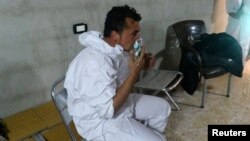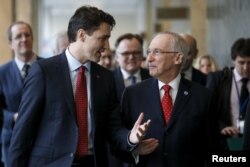The head of a panel investigating deadly chemical weapons attacks in Syria complained Thursday that he is working in what he calls a “highly politicized environment.”
“We do receive, unfortunately, direct and indirect messages all the time from many sides telling us how to do our work,” Edmond Mulet said after talking to the U.N. Security Council Thursday. “Some of these messages are very clear in saying that if we don't do our work according to them ... they will not accept the conclusions.”
Mulet did not tell reporters exactly who was pressuring the panel, but he did say it was coming from “everywhere.”
He appealed to those harassing the panel to let it do its work independently, impartially and objectively.
Sarin gas attack
Mulet is heading a joint investigation by the United Nations and the Organization for the Prohibition of Chemical Weapons.
The panel is looking into the April 4 sarin gas attack on Khan Sheikhoun that killed at least 87 people.
Video of the attack, which included pictures of children foaming at the mouth and struggling to breathe, shocked the world.
US airstrike
The United States and its allies blamed the Syrian regime of Bashar al-Assad, prompting President Donald Trump to order an airstrike on the Syrian base from where the poison gas attack was apparently launched.
Syria and its Russian allies deny Assad's forces were responsible.
The investigators also plan to look into several other chemical weapons attacks in Syria.
They concluded that the Syrian military was behind two previous gas attacks and blamed Islamic State for using mustard gas in 2015.






